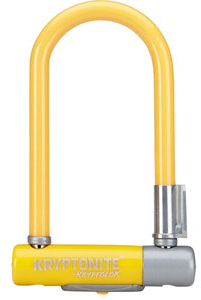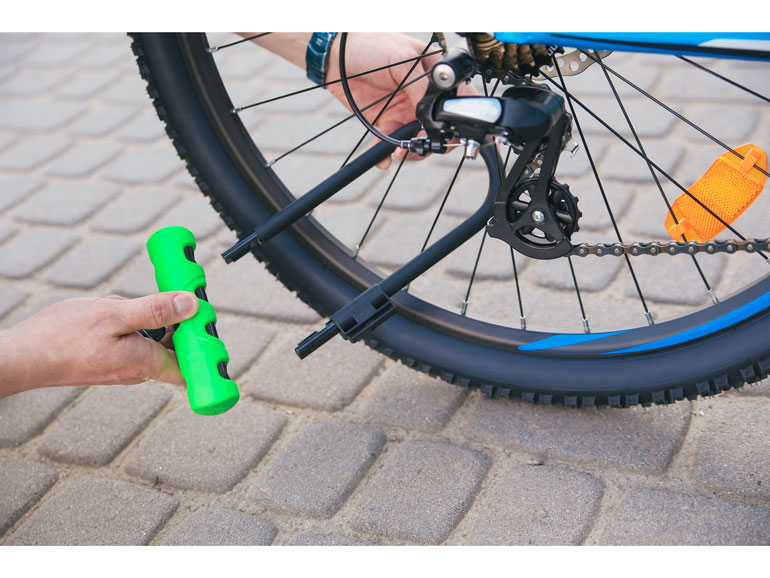What Are the Different Types of Bike Locks?
Exploring the World of Bike Security: Different Types of Bike Locks
Bicycles, much like any prized possession, need robust security to protect them from the unsavory hands of thieves.
This is where bike locks step into the limelight, acting as staunch protectors of your two-wheeled companion.
But not all bike locks are created equal.
From U-locks to chain locks, folding locks to smart locks, each type serves a unique purpose and offers varying degrees of protection.
Let’s delve into the fascinating realm of bike locks and examine the different types of bike locks available, helping you find the perfect guard for your beloved bicycle.
- U-lock
- Cable lock
- Chain lock
- Folding lock
- Smart lock
- Wheel and Seatpost lock
- Frame lock
- Reputable Lock Manufacturers
If you are interested in the specific considerations about what you need to look out for when buying a bike lock read our ‘How to Buy a Bike Lock’ guide here.
Understanding the Different Types of Bike Locks
U-locks
 U-locks, also known as D-locks, are renowned for their strength and resistance to attacks.
U-locks, also known as D-locks, are renowned for their strength and resistance to attacks.
They consist of a rigid U-shaped shackle made of hardened steel, providing excellent protection against cutting and leverage attempts.
When selecting a U-lock, ensure the shackle is thick enough to deter bolt cutters and that the locking mechanism is resistant to picking.
U-locks are popular among urban cyclists due to their high security level.
Benefits of U-Locks:
- High security level: Resistant to common theft tools.
- Versatile: Can secure your bike to various objects.
- Deterrent: Their sturdy appearance discourages theft.
- Variety of sizes: Fits different bikes and locking points.
- Durable: Built to withstand harsh conditions.
- Cost-effective: Offers high security without a hefty price tag.
Drawbacks of U-Locks:
- Limited Flexibility: May not fit around larger objects.
- Heavy: Can be burdensome to carry around.
- Potential Damage: Hard metal can potentially scratch your bike.
- Limited Coverage: Only secures a portion of the bike, leaving wheels or accessories at risk.
- Requires a Mount: Typically need a mount to attach to the bike when riding.
Cable Locks
 Cable locks are lightweight and flexible, offering versatility in securing your bike.
Cable locks are lightweight and flexible, offering versatility in securing your bike.
These locks consist of a long cable made of braided steel or durable synthetic fibers, often combined with a padlock or combination lock.
Cable locks are great for low to medium-risk areas and can easily fit around various objects, making them convenient for quick stops.
However, they offer less protection against cutting attacks compared to U-locks or chain locks.
Advantages of Cable Locks:
- Highly Flexible: Can be wrapped around various structures.
- Lightweight: Easier to carry around compared to heavier lock types.
- Covers More Area: Can secure multiple parts of the bike at once.
- Convenient: Many come with integrated locks or combination locks.
- Wide Range of Lengths: Offers flexibility for different situations.
- Typically Lower Cost: More affordable than many other lock types.
Drawbacks of Cable Locks:
- Lower Security: More susceptible to bolt cutters and other theft tools.
- Limited Deterrence: Not as intimidating as more robust lock types.
- Durability: May wear out or rust quicker than other types.
- False Sense of Security: Might look secure, but can be compromised easily.
- Longer Lengths: Can be bulky and difficult to transport.
Chain Locks
 Chain locks provide a high level of security and versatility.
Chain locks provide a high level of security and versatility.
They consist of a long chain made of hardened steel links, typically encased in a fabric sleeve to protect your bike’s frame from scratches.
Chain locks are highly resistant to cutting and leverage attacks, making them ideal for high-risk areas. Look for chain locks with a sturdy padlock or disc detainer mechanism for added security.
Keep in mind that chain locks tend to be heavier and less portable than other options.
Benefits of Chain Locks:
- Strong Security: Often made of hardened steel, resistant to common theft tools.
- High Flexibility: Can be wrapped around a wide range of objects.
- Multiple Parts Secured: Can protect both frame and wheels if long enough.
- Intimidating Appearance: Its hefty look can act as a deterrent to thieves.
- Range of Thicknesses: Thicker chains offer greater security.
- Durability: Typically resistant to weather conditions and wear and tear.
Drawbacks of Chain Locks:
- Heavy: Larger and thicker chains can be quite heavy to carry around.
- Can Damage Bike: Without proper coating, metal chains can scratch the bike’s frame.
- Limited Portability: Due to their weight and size, they can be challenging to transport.
- Price: High-security chain locks can be more expensive than other lock types.
- Not All Are High Security: Thinner, lighter chains may not provide sufficient protection.
User
Folding Locks
 Folding locks are a relatively newer option in bike security.
Folding locks are a relatively newer option in bike security.
These locks feature multiple metal plates that articulate, allowing them to fold together into a compact shape when not in use.
Folding locks offer a balance between security and portability.
They are lightweight, easy to carry, and provide a decent level of protection against cutting tools.
Folding locks are popular among commuters and urban cyclists who require a lock that can be easily transported.
Benefits of Folding Locks:
- Compact: Folds down to a small size for easy transport and storage.
- Flexible: Can lock the bike to a wide range of objects.
- Protective Coating: Often comes with a rubber or silicone coating to protect the bike frame.
- Balanced Security: Typically offers a good balance between security and weight.
- Easy to Carry: Comes with a mount to attach to the bike when not in use.
- Wide Locking Area: Can secure multiple parts of the bike simultaneously.
Drawbacks of Folding Locks:
- Security: Although robust, they’re not as secure as high-end U-locks or chain locks.
- Weight: Can be heavier than cable locks, though lighter than most chain locks.
- Size: While compact, they may not cover as much area as a chain or cable lock.
- Price: High-quality folding locks can be on the pricier side.
- Locking Mechanism: Some models might have more complex locking mechanisms than other lock types.
Smart Locks
 With advancements in technology, smart bike locks have entered the bike lock market.
With advancements in technology, smart bike locks have entered the bike lock market.
These locks can be controlled and monitored through smartphone apps, offering features like keyless unlocking, tamper alerts, and GPS tracking.
Smart locks provide convenience and additional security features.
However, they may be more expensive than traditional locks and require battery power or charging.
Advantages of Smart Locks:
- Keyless Entry: Can be locked and unlocked using a smartphone.
- Real-Time Alerts: Send notifications to your phone for attempted theft or tampering.
- GPS Tracking: Some models offer tracking features for lost or stolen bikes.
- Access Sharing: You can grant access to others through the mobile app.
- Activity Monitoring: Some offer logs of locking and unlocking activities.
- Integration: May integrate with other smart home devices or virtual assistants.
Drawbacks of Smart Locks:
- Dependence on Technology: Relies on a functioning smartphone, app, and sometimes a data connection.
- Battery Life: Need to ensure the lock is charged to operate.
- Price: Typically more expensive than traditional lock types.
- Security: Despite high-tech features, the physical security may not be as robust as U-locks or chain locks.
- Vulnerability to Hacking: Though rare, smart locks could potentially be hacked.
Wheel and Seatpost Locks
 Wheel and Seatpost locks are specialized locks designed to protect specific components of your bicycle.
Wheel and Seatpost locks are specialized locks designed to protect specific components of your bicycle.
These locks are typically lightweight and compact, providing a deterrent against quick theft attempts.
Wheel locks secure your bike’s wheels by locking them in place, preventing them from being easily removed.
Seatpost locks secure your bike seat to the frame, deterring seat theft.
While these locks don’t provide comprehensive protection for the entire bike, they serve as additional layers of security when used in conjunction with other locks.
Wheel and Seatpost Locks Pros:
- Specific Protection: Designed to secure often-targeted parts of a bike: the wheels and seatpost.
- Convenience: Once installed, there’s no need to carry them around or remove them.
- Fast and Easy: Speed up the locking process, especially when used in conjunction with another lock.
- Deterrent: Can discourage opportunistic thieves.
Wheel and Seatpost Locks Cons:
- Limited Security: Only protect specific parts of the bike. A separate lock is still needed for the frame.
- Compatibility: Might not fit all bikes, wheel sizes, or seatposts.
- Potential for Overlooking: Since they’re always on the bike, you might forget to use an additional lock.
- Lost Keys: If the key is lost, removing the lock can be difficult.
Frame Locks
 Frame locks, also known as cafe locks or ring locks, are commonly used in European countries as a primary means of securing bicycles.
Frame locks, also known as cafe locks or ring locks, are commonly used in European countries as a primary means of securing bicycles.
These locks are permanently mounted on the bike’s frame and lock the rear wheel, preventing it from spinning.
Frame locks are convenient for short stops, allowing you to quickly secure your bike without needing to carry an additional lock.
However, they are not suitable for long-term or high-risk security, and it is recommended to use them in combination with other locks for maximum protection.
Frame Locks Pros:
- Easy to Use: Frame locks are attached to the bike frame and are simple to operate.
- Always Available: Since the lock is permanently on the bike, you won’t forget to bring it along.
- Key Not Needed: Some models allow you to lock it without needing the key.
- Deters Opportunistic Thieves: Prevents the wheel from turning, making quick getaways difficult.
Frame Locks Cons:
- Limited Security: Protects the bike from being ridden away, but doesn’t secure the bike to a stationary object.
- Not Universal: May not fit all types of bikes.
- Does Not Secure All Components: Does not protect the front wheel or other components from being removed.
- Not Ideal for High Crime Areas: Best used in conjunction with another lock in high-risk areas.
Reputable Manufacturers of Bike Locks
Here’s a list of some highly recommended bicycle lock manufacturers known for producing high-quality and reliable locks:
- Kryptonite
- ABUS
- OnGuard
- Hiplok
- Master Lock
- TiGr Lock
- Blackburn
- Foldylock
- Squire
- Trelock
- Litelok
- AXA
- Onguard
- FOLDABLE LOCKS
- ABUS Bordo
- RockyMounts
- Hiplok
- Knog
- Altor
- Seatylock
These manufacturers offer a range of bike locks, including U-locks, chain locks, cable locks, and folding locks, among others.
It’s worth noting that the “best” bike lock for you depends on your specific needs, budget, and the level of security required in your area.
Conduct further research on the specific models offered by these manufacturers to find the lock that suits your preferences and provides the level of security you’re seeking for your bicycle.

